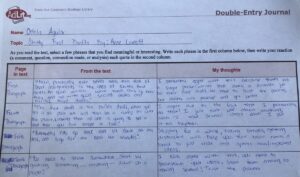James Baldwin’s “A Talk to Teachers,” suggests that the world holds a lot of data to learn contrasted with what you are encouraged when he says “the world is bigger.” Baldwin states disclosures about America’s set of experiences planning to assist one with seeing their actual worth as opposed to being bound by “some random organization, some random arrangement, some random ethical quality.” It is the idea of attempting to locate one’s own self-esteem, battling for yourself in spite of the profoundly engraved generalizations of individuals of color in America’s way of life. Baldwin advises understudies to expand their viewpoints and utilize their entitlement to inspect everything to turn out to be more instructed. Anything is possible for you, on the off chance that you free all limits.
Something that I personally wished that I would have been taught during school was about financial income, taxes, everything that has to deal with money. Why? Well, to start, money revolves around us, as college students sometimes financial aid doesn’t cover everything so that forces us to take out loans. All we can basically say that we know about loans is that you have to pay it back, though nobody really tells us that sometimes they charge you fees and interest. Like the credit cards, having a good credit score is nice to have but the school systems don’t necessarily educate that to us. Everyone’s dream here is to eventually own their own house and cars, in order for that you might need to apply for credit. Though we were never actually told how to apply for it nor how to have a stable balance of payment so you won’t mess up your credit score. I thankfully have somewhat knowledge about those categories because I do my research and my parents talk about them to me. But it is not the same as trying to understand it on your own, the education system should at least push all schools to give a class only for finance, especially in high schools.





Recent Comments